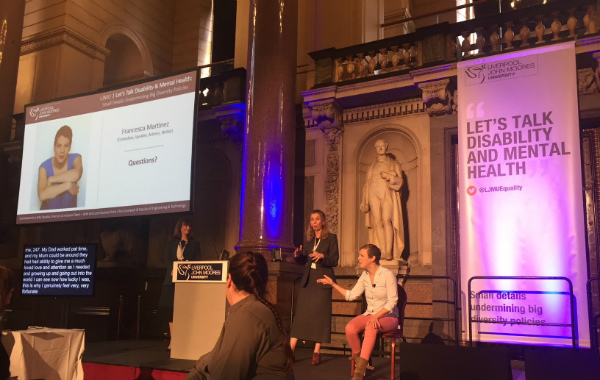
As Result CIC Directors, we have our own experience of disability and mental health issues and the interplay between the two. We use this experience positively in our training and coaching work.
When one of our clients, Liverpool John Moores University (LJMU), invited us to a conference to open up this topic and ‘ensure staff and students have a sense of belonging, enjoy work or studies and contribute their part’, we were keen to attend. Mental health is a hot topic. It is rapidly going up policy makers’ agendas, not least because of increasing awareness of the role good mental health plays in happy, productive workforces and student populations.
The LJMU speakers were diverse leaders in their fields, ranging from Public Health policy, through academic research on disability to front-line managers at the University and activists in the field of arts. Their contributions and the opportunity for debate made for a thought-provoking day.
Here are some of the highlights for us:
Gregor Henderson (National Lead, Well being and Mental Health, Public Health England) emphasised the need to reframe how we look at, and think, of mental health. While he made the strong economic argument that investment in good mental health brings a return of up to 400% within 3 years, his primary focus was on people’s need to feel they belong, feel loved and that they have a purpose and a contribution to make in society.
Professor Val Williams (Professor of Disability Studies at the University of Bristol) discussed the gap between policy and social practices in relation to the UK’s disability rights law. We were taken with her account of how an inclusive approach right from the start of any process can change what are considered to be ‘normal’ social practices – and change them for the better for everyone. She also used the term ‘emotional labour’ to describe the sometimes huge burden for disabled workers when organisations and employers treat disability as an afterthought rather than as part of the human experience.
A question to Rosie Tressler (CEO, Student Minds at LJMU) and her team highlighted how formal systems for access to support, including sometimes lengthy waiting lists, can put people who need help off from asking for it. This person said that drop-in services could catch people earlier and give them access to support when they needed it. Another question raised a good point about how people with mental health issues are supported in the transition from university life to the outside world of work
Ruth Gould, MBE (Director, DaDaFest and Fellow, LJMU) challenged the figures given for mental health issues (one speaker said ‘1 in 4’ another ‘1 in 6’. She said the reality was ‘1 in 1’: every one of us at some point in our life would have to deal with stuff which would affect our mental health.
Professor Geoff Layer (Vice Chancellor, University of Wolverhampton and Chair of the Disabled Student Sector Leadership Group) reinforced Professor Williams’ point that good practice and inclusive practice benefits everyone.
Comedian and actress, Francesca Martinez, used her upbeat dark humour to deliver a message about standing out: it can be isolating at first but can give opportunities which would not otherwise be available and if you view it as positive, then it can be.
Thank you to LJMU for the invitation, for a stimulating day out and most of all for the opportunity to meet a fascinating bunch of people. We have been invited to speak at the next event in November and are already looking forward to it!